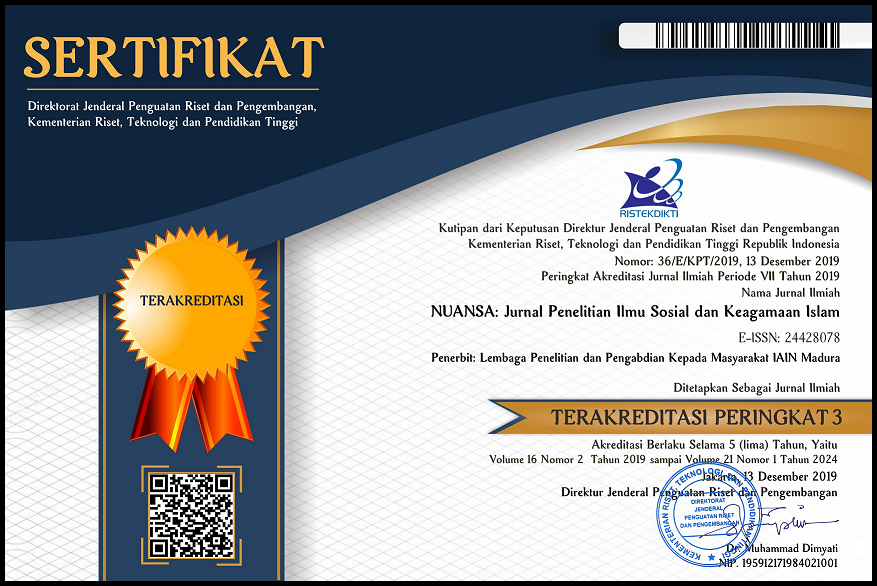ANALISIS TINGKAT KEMAMPUAN KEUANGAN DAERAH DALAM MENDUKUNG PELAKSANAAN OTONOMI DAERAH
 Abstract views: 3543
,
Abstract views: 3543
,
 PDF downloads: 3557
PDF downloads: 3557
Abstract
The purpose of this study was to determine the level of financial capability in Pamekasan in order to support the implementation of regional autonomy. This study took place in the Finance and Asset Management Agency Pamekasan regency. While the data used in this study is the financial data in the budget Finance and Asset Management Agency Regions 2011-2015 fiscal year. The data collection techniques is to study literature and documentation
This research method is descriptive quantitative, using financial ratios, ie the ratio of local financial independence, the ratio of the degree of decentralization, local financial dependency ratios.
The results of the analysis conducted of data obtained as follows: Based on the ratio of local financial independence shown by the average ratios are 36.53%% remained between 25% - 50% are categorized as instructive meaningful relationship patterns Pamekasan government's ability to meet funding needed to perform the duties of Government, Development and Social Services community is still relatively low despite the years has increased and decreased. The degree of decentralization ratio only has an average of 6.4%. this means that the level of financial independence still low Pamekasan in implementing autonomy. Based on the area of financial dependency ratios averaging 19% are in scale interval, 10.01 to 20.00% this means that This means revenue (PAD) has a dependency large enough to cover immediate expenses and Pamekasan government still depends on the source financial receipts from central government and provincial transfers.Downloads
References
Abdul Halim. 2001. Manajemen Keuangan Daerah, Yogyakarta: UPP YKPN.
Abdul Halim. 2002. Akuntansi Sektor Publik. Jakarta : Salemba Empat.
Anita Wulandari. 2001. Kemampuan Keuangan Daerah. Jurnal Kebijakan dan Adminislrasi Publik Vol 5 No 2 November
Bahtiar Arif, Muchlis, Iskandar. 2002. Akuntansi Pemerintahan, Jakarta : Salemba Empat.
Hadari Nawawi. 1991. Metode Penelitian Bidang Sosial. Yogyakarta : UGM Press.
Helfert, Erich. 2000. Teknik analisa Keuangan. Jakarta : Erlangga.
Kustadi Arinta. 1996. Pengantar Akuntansi Pemerintahan. Bandung : Citra Aditya Bakti.
Mahmudi. 2010. Analisis Laporan Keuangan Pemerintah Daerah. Yokyakarta : Sekolah Tinggi Ilmu Manajemen YKPN
Mardiasmo., 2009, Akuntansi Sektor Publik, Yogyakarta: ANDI.
Mohammad Nazir. 2003. Metode Penelitian. Jakarta : Ghalia Indonesia.
Mudrajat Kuncoro. 1997. Ekonomi Pembangunan : Teori, masalah-masalah dan kebijakan. Yogyakarta : UPP YKPN.
Nur Indriantoro, Bambang Supomo. 2002. Metode Penelitian Bisnis. Yogyakarta: BPFE.
Nirzawan. 2001, Tinjauan umum terhadap sistem pengelolaan KeuanganDaerah di Bengkulu Utara, Manajemen Keuangan Daerah.Yogyakarta : UPP YKPN. v-
Nataluddin. 2001. Potensi dana perimbangan daerah pada pemerintah daerah di Propinsi Jambi, Manajemen Keuangan Daerah. Yogyakarta: UPP YKPN.
Revrisond Baswir. 2000. Akuntansi Pemerintahan Indonesia. Yogyakarta: BPFE.
Slamet Munawir. 1995. Analisa Laporan Keuangan. Yogyakarta: Liberty.
UU RI. 2004. Undang-UndangRipublikIndonesia Nomor 32 Tahun 2004 tentang Pemerintah Daerah.
UU RI. 2004. Undang-UndangRipublik Indonesia Nomor 3 3 Tahun 2004 tentang Perimbangan Keuangan antara Pusat dan Daerah.
UU RI. 2000. Peraturan Pemerintah Nomor 105 Tahun 2000 Tentang Pengelolaan dan Pertanggungjawaban Keuangan Daerah.
The journal operates an Open Access policy under a Creative Commons Attribution-NonCommercial 4.0 International License (CC-BY-NC) 
Authors who publish with this journal agree to the following terms:
- Authors retain copyright and grant the journal right of first publication with the work simultaneously licensed under a Creative Commons Attribution License that allows others to share the work with an acknowledgement of the work's authorship and initial publication in this journal.
- Authors are able to enter into separate, additional contractual arrangements for the non-exclusive distribution of the journal's published version of the work (e.g., post it to an institutional repository or publish it in a book), with an acknowledgement of its initial publication in this journal.
- Authors are permitted and encouraged to post their work online (e.g., in institutional repositories or on their website) prior to and during the submission process, as it can lead to productive exchanges, as well as earlier and greater citation of published work.






















